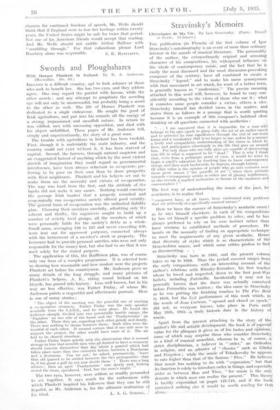Stravinsky's Memoirs
Chroniques de Ma Vie. By Igor Stravinsky. (Paris : Denol
et Stt-4.51e. 111' francs.)
Tin?. publication (in -Wrench) of the first volume of Igor Stravinsky's autobiography is an event of more than ordinary interest in the annals of musical literature. The personality of the author,, the extraordinarily original and arresting character of his compositions, his wideSpread influence on the whole of contemporary music ; and the fact that he is easily the most disetissed and the most discussion-provoking composer of the century, have all combined to create a Stravinsky " legend," and to make his name synonymous with that movement in art which, for want of a better term, is generally known as " modernism." The precise meaning attached to this word will, however, be found to vary con- siderably according to the views of those who use it;' what it connotes some people consider a virtue; others. a. vice. Stravinsky himself has decided views in the matter, and states them as follows in a passage that is worth quoting because it is an example of this composer's habitual clear thinking on all questions connected with aesthetics :
• I ". . . I am convinced that it is impossible for a man WM
belongs to own epoch to grasp fully the art of ari earlier-epoch and to pereciviiits true significance through the v'eil'of out-worri formai and a Vocabulary that is' no longer in use, unless he p)ssessee a lively and sympathetie,understanding of, the times in which he lives, and participates canseiciusly•in theHie that goes on around him. For only those who are fully alive are capable of discoveriag true life in what is supposed to be "dead." That is why I think that, oven from a pedagogic point of view, it would be wiser to begin a pupirs'edUcation by teaching him to know contemporary things, and then work backwards, by degrees, through history. . . . Of what value•is- the opinion of people. who go into ecstasies over these groat names (" the pontiffs of art ") when their attitude towards contemporary artists is either one of gloomy indifference, or else reveals a marked inclination in favour of the mediocre and
commonplace ? " 1 The best way of understanding the music of the past, he' continues,' is to realize that - " composers have, at all times, been confronted with problemi that are primarily of a specifically musical nature."
Here we have the essence of Stravinsky's aesthetic creed as he says himself elsewhere, in each of, his composition he has set himself a specific problem to Solve, and he has always preferred to rely on his own instinct rather than have recourse to established methods of' procedure. He insists on the necessity of finding an appropriate technique to meet the requirements of any given aesthetic.. Hence that diversity of styles which is so characteristic of thel Stravinskian oeuvre, and which some critics profess to find so disconcerting; StraVinsky was born .1882, and the present_ yolurnel takes us up to 1020. Thus the period covered ranges troll the early compositions, with an • interesting account of the) author's relations with Rimsky-Korsakov, his first teacher Whom he loved and respected, down to the first post-War ballets; including Pulcinella. Incidentally it may not be generally known that the Sacre was actually conceived; before Pelrouchka was written ; the idea came to Stravinsky as he was putting the finishing touches to The Fire Bird in 1910, but the Tag; performance of this work which, in the words of Jean Cocteau, " opened and closed an epoch,"- did not as everyone knows, take place in Paris until. May 28th, 1913—a. truly historic date in the history of; Music.
Apart from the interest attaching to the story of the, author's life and artistic development,the book is of especial value for.the glimpscS it..gives us of.his tasteaand oliinions;; some of which may surprise those who consider Stravinsky; as a kind of musical .anarchist, whereas he is,. of course, ,a; strict • disciplinarian, a believer ," order„" an Orthodox in religion, and an admirer of " classics " such as Glinka and Pergolesc ; while the music of. Tchaikovsky he appears, to rate higher than that of the famouS " Five." He believes that music has nothing to do with " expression," but that its function is solely to introduce oreler.in things, and especially order as between .Man and Time, " for music is the only domain in which man can realize the present." This theory is lucidly • expoun'dOd. :Bag's 1.1.0-118, and if the book. Contained nothing else it would be worth reading for that alone.














































 Previous page
Previous page